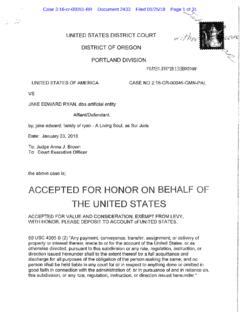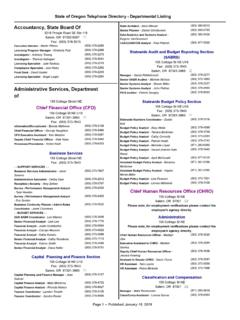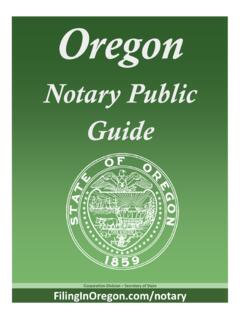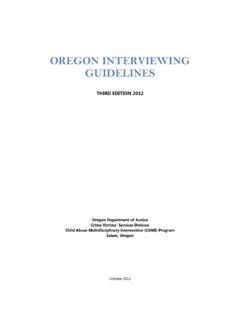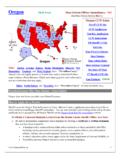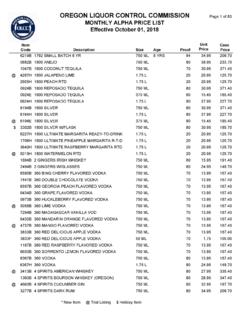Transcription of STATE OF OREGON - media.oregonlive.com
1 K:\oprr\19\lc0219 Dexter A. Johnson LEGISLATIVE COUNSEL 900 COURT ST NE S101 SALEM, OREGON 97301-4065 (503) 986-1243 FAX: (503) 373-1043 STATE OF OREGON LEGISLATIVE COUNSEL COMMITTEE August 21, 2018 Senator Arnie Roblan, Chair Senate Interim Committee on Education 900 Court St NE S417 Salem OR 97301 Re: Sexual Abuse in Schools Dear Senator Roblan: The Senate Interim Committee on Education requested an opinion related to sexual abuse in schools. Specifically, the committee asked: (1) whether any adjustments to statutory law are required to bring STATE law into compliance with 20 7926; (2) what possible statutory changes could be enacted based on the Whitehurst Report1; and (3) how mandatory reporting requirements interact with education law. These three issues have been addressed in a single opinion to give legislators a single reference source for the purpose of revising STATE law related to sexual abuse in schools.
2 I. ANALYSIS OF 20 7926 A. Overview of 20 7926 and ORS to The Constitution does not give Congress any authority related to education, which makes education the responsibility of the states . The lack of specific constitutional authority means that Congress must rely on other constitutional authority to enact legislation related to education. One of the methods by which Congress enacts legislation related to education is through the Spending Under that clause, Congress makes distributions of federal funding to states contingent on the states compliance with legislation enacted by Congress. Congress has exercised this authority with the Every Student Succeeds Act (ESSA).3 Passed in 2015, ESSA replaced the federal standards for education that had been prescribed by the No Child Left Behind Act of One of the federal standards enacted under ESSA is the prohibition on aiding and abetting sexual abuse in public kindergarten through grade 12 schools.
3 The standards are codified as 20 7926, which provides, in part: 1 See infra note 30. 2 Article 1, section 8, United states Constitution. 3 114-95. 4 107-110. Senator Arnie Roblan August 21, 2018 Page 2 k:\oprr\19\lc0219 (a) IN GENERAL A STATE , STATE educational agency, or local educational agency in the case of a local educational agency that receives Federal funds under this chapter shall have laws, regulations, or policies that prohibit any individual who is a school employee, contractor, or agent, or any STATE educational agency or local educational agency, from assisting a school employee, contractor, or agent in obtaining a new job, apart from the routine transmission of administrative and personnel files, if the individual or agency knows, or has probable cause to believe, that such school employee, contractor, or agent engaged in sexual misconduct regarding a minor or student in violation of the law.
4 The elements of the section may be summarized as: (1) a prohibition imposed on a school employee, contractor or agent or a STATE or local educational agency (2) against assisting (3) a school employee, contractor or agent (4) in obtaining a new job (5) when the individual or agency knows, or has probable cause to believe, that (6) the employee, contractor or agent engaged in sexual misconduct regarding a minor or student. The federal standard addresses a practice that has occurred across the country in which school districts allow, or even encourage, employees with certain problematic behavior to seek employment in other school districts and do not report the problematic behavior to law enforcement. The practice often allows the employee to continue with the problematic behavior in the new school district and has been termed passing the trash.
5 OREGON has its own approach to addressing the practice of passing the trash. OREGON was one of the first states to address the practice5 when the Legislative Assembly enacted chapter 93, OREGON Laws 2009. Primarily codified as ORS to , the OREGON law establishes investigatory, reporting, hiring and termination standards related to school employees. OREGON s law is considered one of the most comprehensive laws of its kind in the Both 20 7926 and ORS to address the practice of passing the trash, but the federal and STATE laws take different approaches. As explained in greater detail below, the federal law is more encompassing in addressing the actors covered by the law and the actions taken by a person seeking new employment, while the STATE law is more encompassing in addressing other aspects of the employment relationship.
6 The federal law does not preempt the STATE law, which means that the STATE law must be amended to comply with the federal law. Failure to comply with the federal law could jeopardize federal funding for education in this STATE . 5 Legislation to Address Educator Sexual Misconduct and Abuse, The Enough Abuse Campaign (visited August 10, 2018). 6 A recent survey of states gave OREGON an A for checking an applicant s background before issuing a teaching license, sharing licensing and disciplinary information about sanctioned teachers and requiring mandatory reporting. John Kelly, How USA TODAY Graded the states on Teacher Background Checks, USA Today, February 14, 2016, (visited August 10, 2018). Senator Arnie Roblan August 21, 2018 Page 3 k:\oprr\19\lc0219 B.
7 The Need for STATE Statutory Amendments Although 20 7926 was enacted in December 2015, states have been slow to respond to the changes in federal law. Recognition of states slow responses may be the reason the Department of Education issued a Dear Colleague Letter on June 27, The letter was addressed to the Chief STATE School Officers and sent to the Governors of each STATE to remind them of the provisions of 20 7926. The letter reinforces the department s commitment to compliance with the section, and includes statements that the department will take appropriate enforcement action and that the department intends to [i]n the near future .. reach out to STATE officials to discuss how [they] are meeting their responsibilities under this important provision.
8 The Department of Education s increased scrutiny and interest in this issue makes the need for states to act soon even more imperative. Based on previous actions of the executive and legislative branches of this STATE , we assume that the STATE does not wish to jeopardize federal funding and that the STATE would act in a manner to comply with federal law. We proceed with our analysis in this opinion under that assumption. We also proceed with our analysis under the assumption that the Legislative Assembly prefers to retain the substance of the current STATE law, because we are unaware of any legislative interest in repealing or significantly amending the law. Under 20 7926, states have leeway in how to achieve compliance with the federal law, as states may have laws, regulations or policies related to sexual abuse in schools.
9 Some states rely on their STATE education agencies to compel compliance with the federal law. For example, the Iowa STATE Board of Education acted under its general rulemaking authority relating to accreditation to incorporate the federal law almost verbatim into administrative Other states education agencies take similar action, but under legislative direction. For example, the Virginia General Assembly enacted legislation that directed the Virginia Department of Education and local school boards to adopt policies to implement the provisions of 20 [ ] 7926. 9 Other states rely more on legislative authority. For example, the West Virginia Legislature enacted a statute that copies the federal law almost The solution in OREGON is not as simple as in other states , though, because OREGON already has a law related to sexual conduct in schools and that law has significant differences from the federal law.
10 Retaining the substance of current STATE law while incorporating the provisions of the federal law requires direction from the Legislative Assembly. The Legislative Assembly could adopt legislation to clarify how the two laws should interact for the purposes of avoiding confusion and potentially jeopardizing federal funding for education. C. Elements of Federal Law in Comparison to STATE Law 1. Element 1 Actor to whom prohibition applied 7 Jason Botel, Principal Deputy Assistant Secretary, Office of Elementary and Secondary Education, Department of Education, Dear Colleague Letter on ESEA Section 8546 Requirements, June 27, 2018, available at (visited August 10, 2018). 8 See Proposed Amendments to 281 Iowa Administrative Code 12, as under consideration by the Iowa STATE Board of Education on August 2, 2018, available at visited August 10, 2018).



